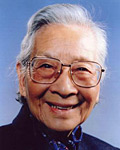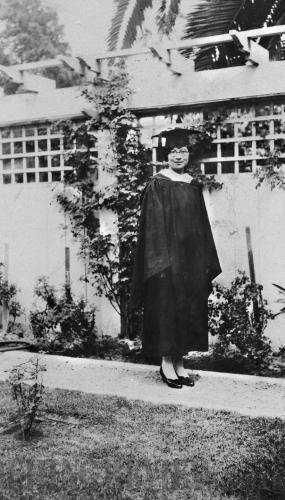|
 |
|
Lei Jieqiong (XINHUA) |
Lei Jieqiong, a famous Chinese educator, scholar and stateswoman passed away in Beijing on January 9. She was 106. Lei, who was also one of the founders and a former chairwoman of the China Association for Promoting Democracy, devoted her whole life to education. Although she witnessed many significant events in Chinese history and played an important role in many of them, she cherished her role as an educator. "I am only a teacher. Among all the titles, I've had, I'd most like to be called professor," she said.
Lei was born into a wealthy, forward-thinking family in Guangdong Province in 1905. Her father Lei Zichang was an open-minded person who had lived in the United States. Influenced by her father, Lei received a modern education and was nurtured by "new thinking" beginning in childhood. New ideas such as democracy and science became solidly rooted in her mind.
 |
|
BLOOM OF YOUTH: Lei Jieqiong graduated with a master's degree in sociology from University of Southern California in 1931 (XINHUA) |
As a young woman, Lei threw herself into numerous patriotic movements in the first half of the 20th century, when China was fraught with dramatic change and turbulence. She was active in the May Fourth Movement, a student-led intellectual revolution and sociopolitical reform movement in 1919. Lei also participated in protests against Japan's invasion into China.
In 1924, Lei went to the United States to study. Although her father hoped she would study medicine or art, Lei unexpectedly chose sociology as her major. She felt sociology could help solve the severe social problems China faced.
"As a scholar influenced by the May Fourth Movement in her youth, Lei's selection of sociology as her major was totally consistent with her values," said Yang Shanhua, a professor at the Department of Sociology of Peking University. Yang was a student of Lei's.
In 1931, Lei received her master's degree in sociology from the University of Southern California and returned to China. She began her teaching career in the Sociology Department at Yanching University, a notable church-affiliated university in Beijing. Before Lei joined the department, almost all its courses were taught by foreign professors. Lei taught such courses as Child Welfare, Females and Society, and Social Work, among others. Meanwhile, she was also engaged in social work research, trying to find solutions for China's social problems.
"Research work must start from reality rather than from theory," said Wang Sibin, a professor in the Department of Sociology at Peking University and a former student of Lei's. Wang said, Lei practiced this principle throughout her life.
"Learning to meet practical needs is what Lei pursued throughout her academic career. She emphasized with the setting of practical problems of China by sociological methods," Wang said.
Lei insisted her courses must be based on fact. Therefore, in the 1930s she and her students conducted several surveys of slums, brothels, and foundling hospitals in Beijing, trying to understand the living conditions of society's lowest classes.
In 1966, with the beginning of the "cultural revolution," Lei was sent to work in the countryside. She remained there until her return to Beijing in 1972, when she began teaching at the School of International Studies of Peking University.
After her arrival at Peking University, Lei started to call for the return of sociology to the curriculum. Thanks to Lei's unremitting efforts, Peking University restored its sociology department in 1982, appointing Lei as a professor. Even though Lei was also serving as vice mayor of Beijing at the time, she devoted all her free time to guiding the training of her postgraduate students.
Lei held the idea that as society progressed, social workers with professional knowledge would be in great demand. So, she recommended great importance be attached to social work education. Eventually, in 1988, Peking University set up China's first graduate program in social work, pushing social work education forward.
Xie Lizhong, Dean of the Department of Sociology at Peking University, called Lei "one of the most important founders of China's modern social work education." Xie said she not only trained many professionals in the field, but also conducted much important research in the field. He said her work had a "far-reaching impact on the development of sociology in China." | 